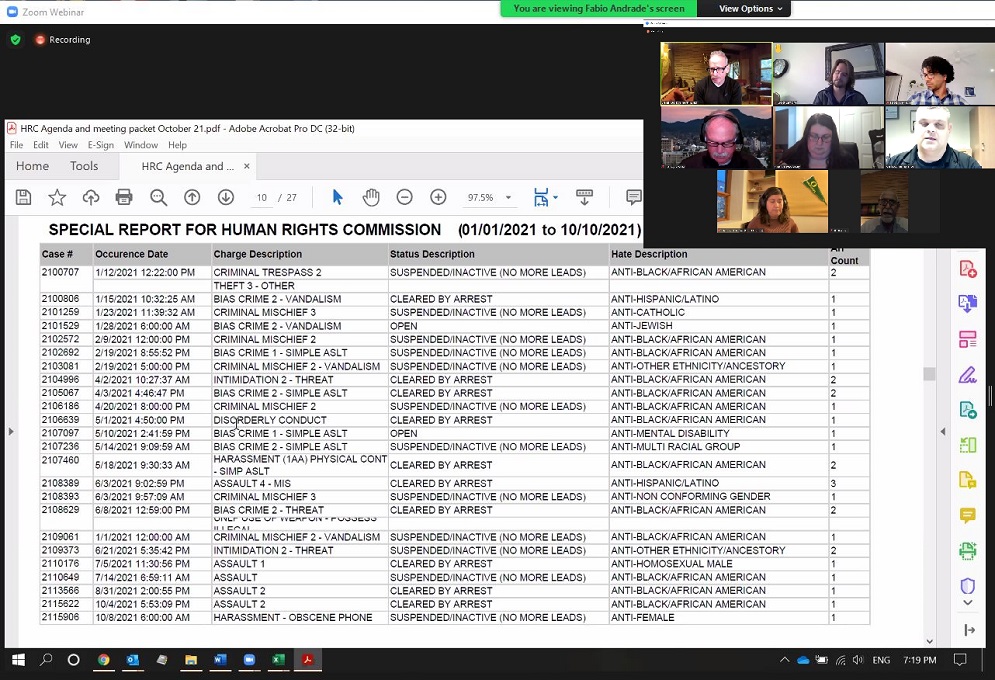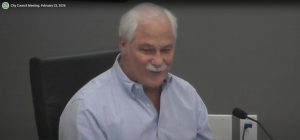HRC hears updates on local bias crimes, City’s unhoused response
7 min read
Eugene's Human Rights Commission reviewed the latest potential bias crimes, and heard from Kelly McIver about the City's unhoused response.
From the October meeting of the Eugene Human Rights Commission, Chair Amanda McCluskey.
[00:00:05] Commissioner Amanda McCluskey: So we have a guest with us today with Kelly McIver. So we will thank you for joining us today.
[00:00:13] Kelly McIver: Thank you. Thank you very much. Thank you for all of your time, really appreciate that you’re willing to spend this on behalf of the Whole Community. My position is Communications Manager for the City of Eugene’s Unhoused Response. And so I’ve filled the role of what in an Incident Command System would be known as a public information officer but essentially I am providing communications between the city of Eugene and the media, members of the provider and advocate communities and I, in my profession, like to try to do things two ways. So I certainly don’t look at it as just something where I’m putting information out via email or social media or postings on the web. I like to be engaged personally. I like to have conversations with people. I like to get information in as much as I’m putting information out. So my role is purely one of communications. I do, when I get information from members of the community, pass that information on to other members of our team, who are the folks who can actually take action on things, whether that’s in policy roles or in actually going out and doing things in terms of the work that’s happening on the streets. And I work very closely with Regan Watjus and Peter Chavannes.
Thank you for supporting
local citizen journalism
[00:01:28] I have been very impressed in the time that I’ve been here with the approach that the city has taken. The fact that they recognize that to be more effective in this, in both trying to reasonably , proactively humanely support the unhoused and also address, health and safety needs in the community that they needed a unified approach to this, rather than just allowing different departments to be responding, scattershot to what was happening. And they have brought that together under strong leadership from the City Manager’s office.
[00:01:59] I have worked with many incident command systems in the past, in my work. And I’m very impressed with the way that the City has done that. I’m also extremely impressed with what I believe is a very strong demonstration on a personal level, and also exhibited through the work that people are doing about how much they care about the community, how proud they are of the City of Eugene, how much they want it to to flourish, but also how much they care about all of its citizens, regardless of those citizens backgrounds and personal conditions.
[00:02:28] As I have begun sharing with citizens who I speak to about this issue, I’ve tried to observe that this is not something that any government, especially smaller local governments, were built to deal with in terms of our funding, our capacity, our readiness for this sort of thing, much in the same way that climate change and other issues of an extra order of magnitude have taken us as communities. We just weren’t built for this sort of thing. It’s not the way that our various offices and agencies were scaled. And it’s something that we’ve all been having to deal with on the fly, including our citizenry.
[00:03:06] And so I’m very eager to hear things that people are interested in and pieces of information about our work and about what’s happening out there that might be of interest to people or might be useful in the work and the advocacy that you do.
[00:03:19] Commissioner Amanda McCluskey: Thank you for coming. We really appreciate having you here. Thank you for your time and we’ll look forward to more information from you. So our next thing, we have our liaisons from Eugene Police Department, Lieutenant Harrison is here, and the floor is yours.
[00:03:33] EPD Lt. Chris Harrison: Alright. Hello everybody. Two cases have come in and the second one, that case may be of interest, so I’ll go over that one with you real quick. This was on October 4th and it was down into Washington and Jefferson street the park where there was a young lady who was black, who was walking through the park, potentially visiting with some people. And one of the ask someone that was in the park, if she could use their cigarette lighter, as she walked over towards them she accidentally kicked over a cup of coffee, which angered another gal in the park and the gal attacked her.
[00:04:09] Over a period of, I believe about 20 minutes, there was two different skirmishes between these gals. But at the end of it, the victim ended up being pretty substantially hurt. She had a couple of broken ribs as well as some lacerations in the head where she was hit with a large stick of some sort, whether it was a two by four, a tree branch, I’m not really sure on that, but anyhow, she was transported to the hospital with those injuries.
[00:04:34] The reason it was reported as a bias crime is because the victim told us that while she was being assaulted, somebody in the group, she thought it was a male voice, yelled a racial slur at her and told her that she needed to get out of there. It’s kind of unique in that this particular assault detectives were able to find video surveillance that caught both audio and video of the assault, as well as one of our Eugene Police Guardian Trailers happened to be in the area also and was able to capture the assault. So, the suspect was identified by one of our detectives. She was arrested, initially denied almost everything, but certainly denied the fact that it was any kind of a racially motivated attack. But she was lodged and charged with assault in the second degree and unlawful use of a weapon. The detective continues to—there was a couple of witnesses that have not been able to be contacted yet.
[00:05:22] I just talked to him today to try and find those people basically to see if there’s any more information. So, like I said, at this point, it has not been charged as a bias crime. But if there was more information, that can certainly be changed.
[00:05:36] Commissioner Daniel Borson: How, and when is the determination ultimately made as to whether this incident was racially motivated and falls under a bias crime and who makes that, how, and when?
[00:05:52] EPD Lt. Chris Harrison: Generally, it’s going to be in combination of the detective and the prosecutor. Ultimately the prosecutor that has the case is going to decide whether or not he or she feels that they can prove that. And it could be a case where sometimes we all think that’s probably what happened, but ultimately the prosecutor decides whether or not they think they can prove it.
[00:06:12] Amanda McCluskey: Thank you for being here with us today, Lieutenant Harrison. We really appreciate your time and willingness to overtime a little bit and good to see you again. I am so sorry, I let us run over time, but maybe we can take Councillor Groves’s question.
[00:06:24] Councilor Randy Groves: Thank you, Chair. Mine is just more of a comment. Going back to the Sentry Trailers, it’s my understanding those are used primarily as a deterrent. In fact, I’ve watched them being utilized in West Eugene quite a bit, and it’s like a lot of crime, right up to the point that one of those units deployed. And then it’s like flipping a switch, the crime stops and that’s really the benefit. And another way to look at it is for every place, every spot the Sentry Trailer is deployed, there are thousands of places all throughout our community with no cameras. The ideal system would be something like London, England has, where they have a CCTV system where they have people that monitor 24-7. And so they can see in real time what’s happening. But a community of our size and the cost associated with it, it’s just really, it’s really tough to have somebody in the seat, especially when we have such a shortage of police officers, dispatchers, detectives, crime prevention specialists. We have not kept pace with the growth of our community. And with limited resources, it’s just really hard to have somebody sit there, but I have heard Chief Skinner say he wishes he could, he wishes he could have a bank of these with somebody going from camera to camera, watching them, as a position. But we’re probably going to need more than what we have now in order for that to happen. But one of the questions I asked early on, ‘Hey, can we just buy some dummy cameras to set up,’ just because it has such a chilling effect on some of the criminal behavior, especially around property crime. It does seem to work on the property crime.




